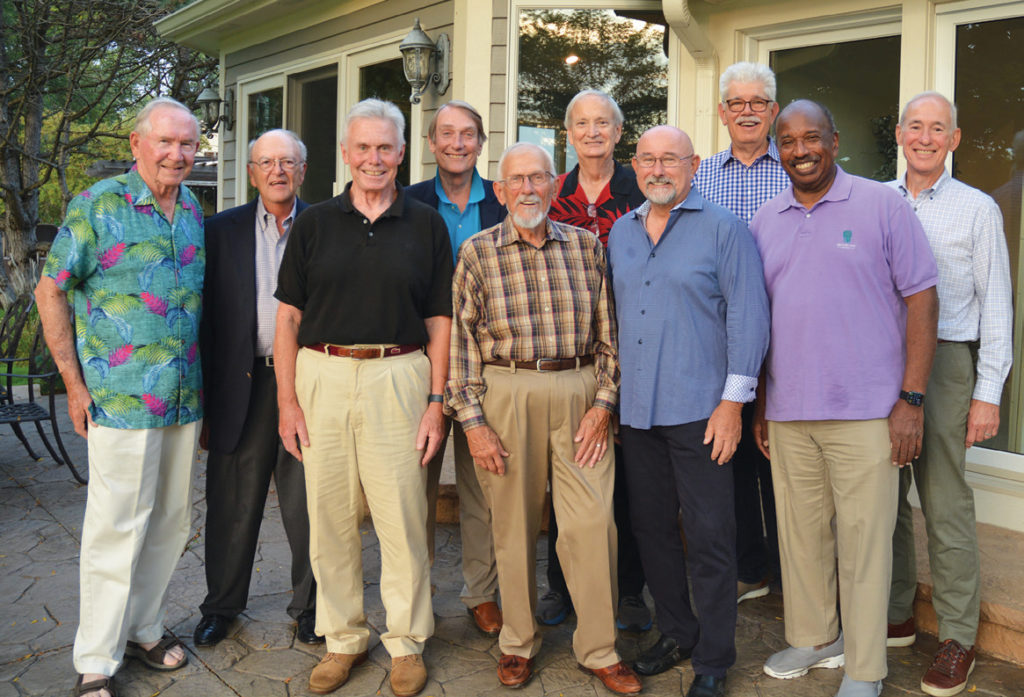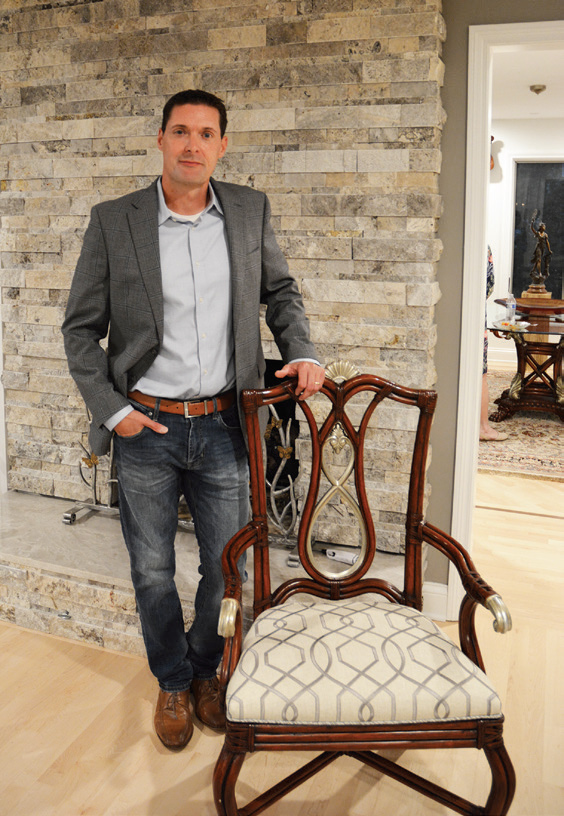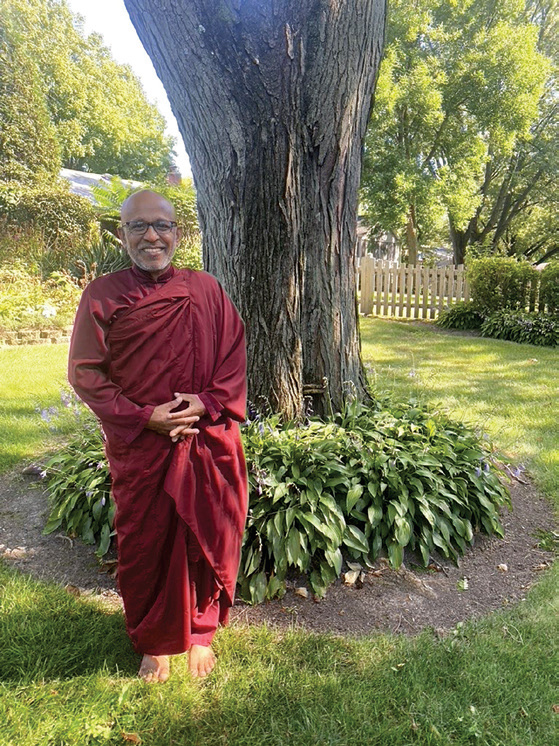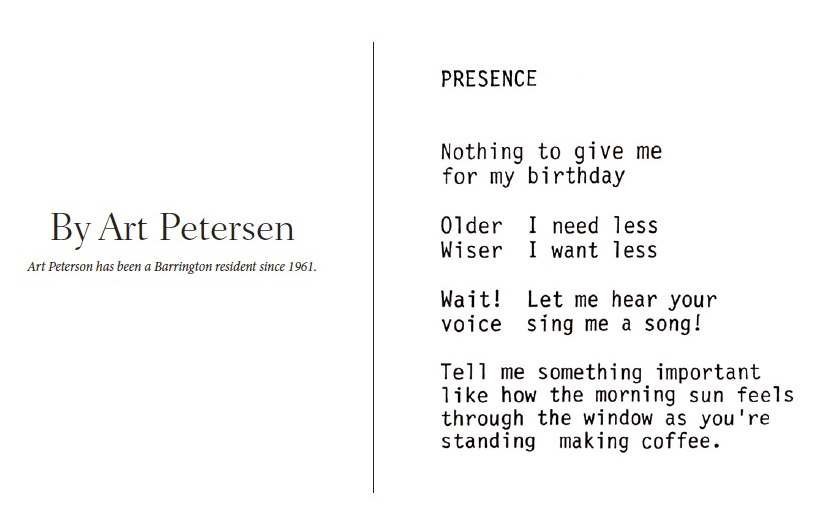
The Thinking Man’s Book Club of Barrington celebrated its 20-year anniversary in September 2022. Chicago based author Charlie Donlea was invited to discuss his latest gripping new thriller and best-seller, “Twenty Years Later.” Donlea is a descendent of the early Barrington Donlea family, who owned farms along the road named after them, from 1865 to the 1930s.
“We had a great meeting with Charlie Donlea—an excellent discussion with a very entertaining author,” club member Jeff Kitz said. “Charlie did pay our group a compliment. He said more of our members had read, and were ready to discuss, his book than most book clubs.”
We spoke with club founders Ned Loughridge and Rich Bowman to learn about them, and the book club’s history.
Can you share your backgrounds with us?
Ned: I was born in Ohio and received my bachelor’s degree from The College of Wooster. I came to the Barrington area in 1981 having been transferred by Kemper Insurance from Cincinnati. After Kemper, I spent over 20 years at Zurich Insurance with several positions in marketing, human resources, and executive management. While at Zurich I earned a Master’s degree in advertising from Northwestern University. Following my Zurich career, I founded two marketing communications consulting firms. Currently, I am on the faculty of Lake Forest College where I teach marketing. I am married to my wife Jo, who was the recording secretary at the fateful meeting where Rich and I decided to form the book group. She said, “Stop talking about it and just do it!”
Rich: I am a graduate of Bradley University and Commissioned a 2nd Lt. five years in the Air Force, having served in Vietnam. I spent 25 years at Baxter Healthcare with an emphasis in marketing and sales management. I’ve been active in the VFW and American Legion as Commander and Chief Financial Officer. I have four children and eight grandchildren. Have been married to my lovely wife Mary Kay for 60 years.
Why did you name your group the Thinking Man’s Book Club?
Rich: I have a good friend in New Orleans who was trying to break into his wife’s book club but found heavy resistance. He decided to form his own men’s book club and named it “The Thinking Man’s Book Club of New Orleans.” Ned and I were sitting on his desk one warm September afternoon, sipping a little wine as we did in those days, and started talking about the idea of forming a men’s book club. I relayed the story of my friend in New Orleans; the rest is history. At the time, 20 years ago, we were the only men’s book club in Illinois.
What are the objectives of your Thinking Man’s Book Club?
Ned: The group shares a passion for learning and a love of books. Yet we come from all walks of life and that diversity allows for wide ranging discussions and the sharing of divergent ideas. Among the group we have doctors, lawyers, business owners, consultants, engineers, and marketers. And along the way we have also grown close, so comradery is also important.
Most people are surprised that, unlike many book groups, we actually read and discuss the books. For many years, Larry Upson, who has since passed away, wrote an extensive review of each book group discussion. His wife says she still has a copy of every review Larry wrote. Jeff Kitz has now taken on that role.
How often do you meet?
Ned: The group meets the third Tuesday of every month. Each month we have a new book. We have a list by month and year of every book we have read. Along the way, we have also had seven authors attend our meetings where their book was to be discussed.
How do you choose your books?
Ned: We’ve tried many ways over the years. Currently everyone is committed to hosting a meeting and moderating a book every year or so. Members suggest books and the group collectively decides what to read. The member suggesting the chosen book is tasked to moderate the discussion.
Is there a book in the 20-year history of your club that stands out?
Rich: Yes, “John Adams” by David McCullough. He was one of our most important founding fathers, a signer and contributor to the U.S. Constitution. A brilliant Harvard trained lawyer. He devoted his entire life to the cause of establishing a new nation and participating in its fruition to greatness. He was both Vice President and President of the United States.
Ned: I’m sure every member will have a different answer. For me, my favorite book was “Shadow Divers” by Robert Kurson. Kurson is a local, North Shore author and this book chronicled a group of divers who discovered a German U-boat off the coast of New Jersey. The book stands out as it delves into the interpersonal relationship between the divers, the art and science of deep-sea diving, and the historical mystery of what U-boat they found.
Robert Kurson was one of the authors who attended our meeting. When I found that he lived locally, I emailed him an invitation. He quickly replied that normally his publicist handles these invitations, but he was so fascinated (he used that word) with a men’s book group he was happy to accept. When he came, he brought his brother along. During our pre-meeting chat he mentioned that he had only made it to #2 on The New York Times Best Seller list, but that his brother had made it to number one. As it turned out his brother, Ken Kurson, wrote Rudy Giuliani’s book “Leadership.”
As a social club, how did you manage through the pandemic?
Ned: Just like the rest of the world, we became proficient with Zoom.
Rich: We never missed a meeting because of the pandemic.
Have any of your members started writing because of club membership?
Rich: Not that I know of.
Upcoming books scheduled by the club are for October: “The Cellist” by Daniel Silva; November: “The Fire is Upon Us” by Nicholas Buccola; and December: “The Lincoln Highway” by Amor Towles.

Can you share some insights about your relationship with the Donlea family of Barrington?
My ancestors owned farmland in Barrington, and in those days, landowners had the road near their land named after them–Donlea Road in Barrington Hills. So, my ancestors left behind the name of a road, but no land or money.
Have you seen any connection between the rigors of your medical education and training, and what goes into writing novels?
I’ve never compared the two. Studying was always challenging. Writing is fun, and I never consider it work in the same way school was. But I’d say discipline is necessary to get through school and to finish a manuscript.
Where do you find inspiration and the ability to recharge your batteries as an author?
My inspiration comes from hearing from readers. I recently had a reader email to tell me that one of my novels got them through their chemotherapy treatments and was a welcomed escape during a time when they needed a break from the reality of their life. A story like that always recharges my batteries.
Does it become easier to write each progressive novel?
Definitely not. I’ve written eight novels, and each one was a struggle. I have a better understanding of the process and more confidence today than I had years earlier that I can finish a manuscript, but the writing is always hard.
What have you learned about your audience members from their feedback?
That thriller and mystery readers are very astute, and that fooling them is becoming harder and harder. It’s especially tough to pull the wool over the eyes of my most loyal readers who have been reading my stories from the very beginning. They are starting to know my “tells” and have made me realize that I need to get even more creative with the twists and surprise endings in my novels. I’ve also learned that even writing one book a year isn’t fast enough for thriller fans. They want a new one as soon as they finish the latest.
Which of your novels was the most challenging to write?
My second, “The Girl Who Was Taken,” because it was the first book I wrote under a deadline. My first novel took many years to write. When I sold it to my publisher, they offered me a two-book deal. After I signed on the dotted line it quickly dawned on me that I had one year to write another book. With my second novel I proved to myself that I could not only write under pressure, but I could churn out a bestseller. “The Girl Who Was Taken” landed on the bestsellers list three weeks after it was published.
What is the most important advice you share with fellow writers?
That deadlines work. Too many aspiring writers use the excuse that they want to write a book, but don’t have time to write. If you create a deadline for yourself, the truth is that you don’t have time not to write.
What is on your bucket list these days?
To finish my next thriller by spring 2023, and then sign a new multi-book deal that will have me writing thrillers for the next many years. And for the paperback of “Twenty Years Later” to land on The New York Times bestsellers list in January.

Photo by Mary Klest
. . . . . . . . . . . . . .
Bhante Sujatha is a Buddhist monk born and raised in Sri Lanka who founded the Blue Lotus Temple in Woodstock in 2012. He recently moved to Barrington. His reasons for living here are similar to many of our own, except that the ranch-style house he lives in is owned by a generous friend. “I am now a house sitter,” he proclaims of his many roles.
“But why here?” I ask.
“My friend thought it a good place for me to be since I love trees and nature. The people are friendly. The town is clean and well organized like my own nature,” he says with a bashful smile. “Also, it’s close to O’Hare Airport.” He travels often to places around the world and has become known as the ‘Loving Kindness’ monk.
I first met Bhante Sujatha in 2017 when on a lark I traveled with him and a handful of people to Sri Lanka. Even though I knew very little about Buddhism, he welcomed me to join them. In that country, people dropped to their knees at his presence. Cars stopped on highways to let him cross the road. What they were acknowledging and what makes him an outlier in our community is his attire. He wears a ruby colored robe and often is barefoot. “At first, I was a bit uncomfortable because of my robe, but not anymore. People recognize me as a spiritual person. They are welcoming towards me. My robe is a symbol that helps me spread a message of loving kindness. So, I am proud of that.” Sitting in a family room chair his demeanor is calm, body relaxed, yet an energy emanates as we start to share thoughts. I ask: “What do Buddhists believe?”
“Believe in yourself.” He pauses and waits for me to catch up with that idea. He tells me there is no conversion attempt. “Follow your faith. You can go to church on Sunday and still practice meditation, mindfulness, and loving kindness,” he says. “Harmony amongst all beliefs.” I wonder if that’s a wish or an observation on his part.
Barrington resident Alan Lykins adheres to Buddhist principles. Though he has never met Bhante Sujatha, he told me: “Buddhism is not a religion. It’s a way of living.” Bhante concurs with Alan’s assessment. “Buddhism is a practical approach. It has no shape. It’s like water in a vessel. The people make it what it is.”
Bhante Sujatha hopes to share Buddha wisdom in our community through meditation sessions in public spaces such as the Yoga Loft in Barrington, one-on-one lessons in private homes, and group workshops wherever he is invited. He describes his job this way: “I help people to be kind, to give and receive love. My purpose is to add more love to the world.”
You can learn more about Bhante Sujatha and his work, including local events, by visiting BhanteSujatha.org.
Mary Klest is a Barrington-based writer and local journalism advocate. She can be reached at mary@maryklest.com.
. . . . . . . . . . . . . . . . . .
The emotional and physical benefits of mediation are well known. Here are a few ideas to consider when getting started.
A full listing of all fall events can be found at the Barrington White House website: www.barringtonswhitehouse.com/events

Art Peterson has been a Barrington resident since 1961.
Share this Story